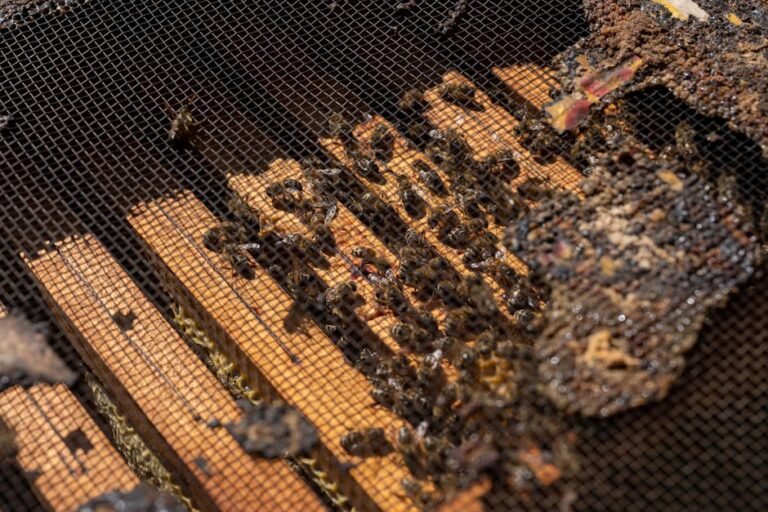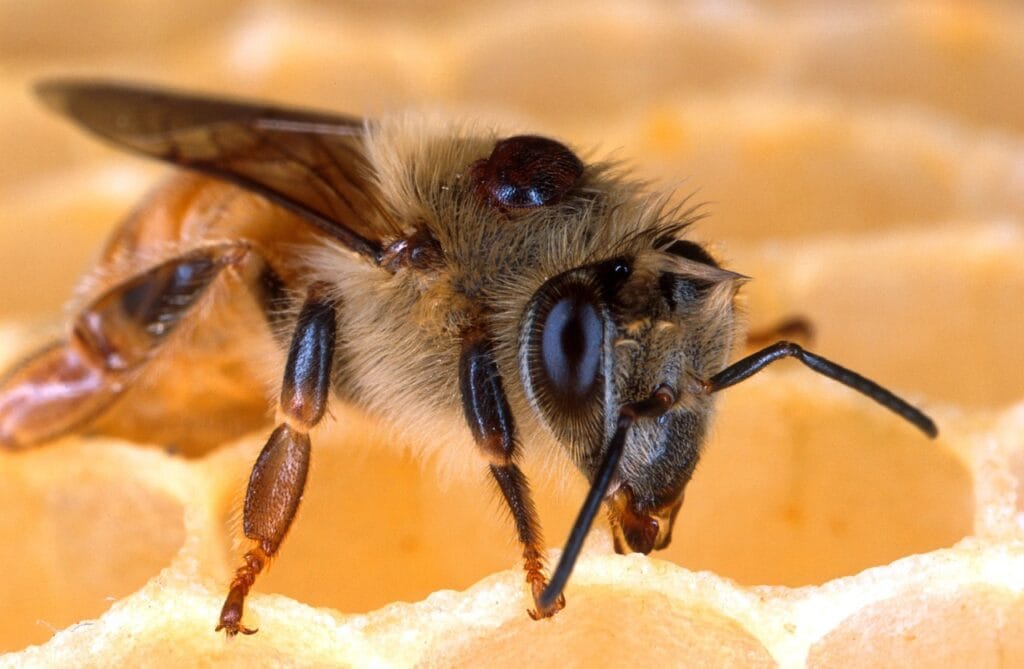Detailed close-up of honeybees on a beehive frame in Garešnica, Croatia, showcasing apiculture.by Vladimir Srajber via pexels
Modern beekeeping has experienced a technological revolution, with innovations spanning from basic hive monitoring to sophisticated AI-powered systems.
These technologies are transforming how beekeepers manage their colonies, improve bee health, and optimize honey production.
Digital Hive Monitoring and IoT Sensors
Smart hive monitoring systems represent one of the most significant advances in modern beekeeping.
Companies like HiveReader, Beebot, and HiveGenie offer comprehensive sensor packages that continuously monitor crucial hive parameters[1][2][3][4].
These systems typically include:
- Temperature and humidity sensors that track internal hive conditions, helping maintain optimal environments for bee colonies
- Weight sensors that monitor hive mass changes, indicating honey production levels and potential swarming behavior
- Sound analysis technology that can detect changes in bee activity patterns, stress levels, and potential health issues
- Vibration sensors that identify unusual colony movements or disturbances[1][5][4]
The BeeConn system exemplifies this technology, offering wireless monitoring for up to 30 scales per gateway, with solar power options for remote locations[6].
Similarly, Nectar Technologies provides RFID-tagged hives that allow beekeepers to scan and collect data as they work, feeding information directly into management portals[7].
Artificial Intelligence and Machine Learning
AI-powered beekeeping is revolutionizing colony health assessment and disease prevention. Advanced AI systems can analyze multiple data streams to provide early warning systems for beekeepers[1][5][8].
Key AI applications include:
- Disease detection algorithms that analyze sound patterns, temperature fluctuations, and visual data to identify problems like Varroa mites, American Foulbrood, and Nosema with up to 95% accuracy
- Predictive swarming models that analyze colony behavior patterns to forecast when bees are likely to swarm, allowing preventive intervention
- Automated pest identification using computer vision to detect and count Varroa mites in real-time through hive cameras[5][8][9]
Apisense represents a cutting-edge example, combining IoT sensors, satellite data, and weather information with proprietary AI algorithms to detect bee diseases and predict their spread in natural environments[8].
The system can reduce bee losses by up to 50% through precise diagnosis and treatment recommendations[8].
Robotic and Automated Systems
Robotics in beekeeping is advancing rapidly, with applications ranging from hive inspection to honey extraction[5][10].
Notable robotic innovations include:
- Automated hive inspection robots equipped with cameras and robotic arms that can regularly photograph hive frames without human intervention
- Robotic honey extraction systems that handle the entire process from uncapping honeycomb to filtering honey with minimal human involvement
- The Beewise BeeHome, which uses robotic arms and cameras to continuously monitor up to 10 hives, providing thousands of data points for AI analysis[11]
The Thermosolar Hive uses solar energy to heat hives to temperatures that bees can tolerate but dangerous Varroa mites cannot, potentially boosting honey production by up to 75%[12].
Flow Hive Technology
The Flow Hive represents a revolutionary approach to honey extraction, allowing beekeepers to harvest honey without opening the hive or disturbing the bees[13][14].
This patented technology uses split-cell honeycomb frames that create channels when activated, allowing honey to flow directly out of the hive into collection containers[13][15].
Benefits include:
- Minimal bee disturbance during honey harvesting
- No need for expensive extraction equipment like centrifuges
- Real-time monitoring through observation windows to determine harvest readiness[13][14]
Pollination Drones and Robotic Pollinators
Robotic pollination is emerging as a supplementary technology to address declining bee populations[16][17][18]. Research teams are developing various approaches:
- Micro-drones equipped with brushes and ionic gels that can transfer pollen between flowers
- Autonomous pollination systems where larger “mothership” drones deploy smaller robotic bees to pollinate fields
- Ground-based robotic pollinators that avoid the complexity of flight while still providing pollination services[16][17][19]
Companies like Polybee and Dropcopter are leading commercial development, with systems capable of pollinating 1,000 flowers in 5-7 minutes using 8-10 robot bees[17][18].
Blockchain and Traceability Systems
Blockchain technology is transforming honey supply chain transparency and authenticity verification[20][21][22].
These systems address the significant problem of honey fraud, which affects an estimated 14% of honey sold globally[21].
Key implementations include:
- HoneyTrace by Intertek, which uses blockchain to verify beekeeper identity, store lab results, and track honey batches through the supply chain
- Honeytrail by Facing Bees Foundation, leveraging the Hedera public network for immutable honey traceability records
- TraceX platforms that document sustainable beekeeping practices and certification compliance[20][21][22][23]
Virtual and Augmented Reality Training
VR and AR technologies are being developed to train new beekeepers and educate the public about bee behavior[24][25][26]. These systems offer:
- Immersive training experiences that allow practice without risking live bee colonies
- Educational AR applications like the Eyesonhives app, which provides augmented reality beehive experiences
- Remote learning modules that combine VR with traditional educational methods for comprehensive beekeeping training[24][25][26][27]
Data Analytics and Management Platforms
Modern beekeeping increasingly relies on comprehensive data management systems that integrate multiple information sources:
- HiveTracks offers cloud-based software for recording hive conditions, mapping foraging areas, and managing apiary information starting at $5 per month
- Mobile applications like Bee Smart help beekeepers select bee-friendly plants and optimize foraging opportunities
- Integrated platforms that combine sensor data, weather information, and management tools for holistic apiary oversight[12][28][29]
Summary
These technological innovations collectively represent a fundamental shift toward precision beekeeping, where data-driven decisions, automated monitoring, and AI-assisted management are becoming standard practices.
While traditional beekeeping knowledge remains valuable, these modern tools are enabling more effective, sustainable, and productive approaches to bee colony management and honey production[1][30][5][28].
⁂
- https://www.miel-imperial.com/en/blog/post/136_technological-innovations-revolutionizing-the-world-of-beekeeping.html?page_type=post
- https://hive-reader.com/sensor-frames
- https://pragmatic.inosens.rs/product-name/beebot/
- https://www.hivegenie.com
- https://blythewoodbeecompany.com/blogs/news/the-future-of-beekeeping-how-technology-is-transforming-the-hive
- https://beeconn.net/store.html
- https://www.nectar.buzz/en/
- https://apisense.ai/en
- https://theconversation.com/how-ai-can-help-protect-bees-from-dangerous-parasites-259495
- https://ecrotek.com.au/blogs/articles/future-beekeeping-modern-technology
- https://phys.org/news/2025-06-robotic-hives-ai-lowering-bee.html
- https://www.fbfs.com/learning-center/5-modern-beekeeping-technologies
- https://en.wikipedia.org/wiki/Flow_Hive
- https://www.youtube.com/watch?v=CtE1v8tixxg
- https://www.youtube.com/watch?v=I_yNn4rjv0Y
- https://dronelife.com/2023/11/03/could-tiny-drone-swarms-help-pollinate-crops-wpi-researcher-develops-robobees/
- https://www.youtube.com/watch?v=ed3jg-xQfPw
- https://www.greenhousegrower.com/technology/how-pollination-drones-are-emerging-as-alternatives-to-bees/
- https://www.npr.org/sections/thesalt/2017/03/03/517785082/rise-of-the-robot-bees-tiny-drones-turned-into-artificial-pollinators
- https://tracextech.com/hive-to-honey-traceability/
- https://www.intertek.com/news/2024/intertek-launches-honeytrace-an-innovative-blockchain-based-traceability-solution-to-combat-honey-fraud/
- https://www.prnewswire.com/news-releases/facing-bees-foundation-launches-honeytrail-enabling-authentic-honey-traceability-on-hedera-network-302154344.html
- https://honeytrail.io
- https://portal.nifa.usda.gov/web/crisprojectpages/1028494-bubo-learning-design-llc-intends-to-create-agricultural-training-solutions-through-the-use-of-virtual-reality-vr-in-rural-settings-the-creation-of-prototypes-will-mimic-hands-on-experiences.html
- https://www.eyesonhives.com/eyesonhives-app-launches-with-augmented-reality-beehive-experience/
- https://www.youtube.com/watch?v=NiRiCWJ7BbA
- https://www.youtube.com/watch?v=YYsbS44TCao
- https://www.startus-insights.com/innovators-guide/beekeeping-trends/
- https://beeprogear.com/en-fr/blogs/beeprogear/ai-powered-beekeeping
- https://insights.made-in-china.com/Future-of-Beekeeping-Equipment-Guide-Innovations-and-Trends-Shaping-Sustainable-Apiculture-Solutions_aGgTWpVOVEHl.html
- https://www.foxhoundbeecompany.com/blogs/beekeeping-equipment/live-bee-hive-scale-and-sensor-data
- https://papers.ssrn.com/sol3/papers.cfm?abstract_id=5187027
- https://www.thinkmind.org/articles/cadat_2024_1_60_20032.pdf
- https://www.sciencedirect.com/science/article/pii/S2772375524001898
- https://arxiv.org/html/2401.09988v1
- https://www.iotforall.com/how-iot-can-save-bees
- https://pmc.ncbi.nlm.nih.gov/articles/PMC11203513/
- https://www.youtube.com/watch?v=Z54bL6kjyOI
- https://www.niagarabeegroup.com/honey-traceability.html
- https://www.youtube.com/watch?v=FencaFmzsxo
- https://texasbutterflyranch.com/2022/04/11/augmented-bee-ality-to-teach-kids-about-bees-at-san-antonios-bee-social-this-saturday/
- https://www.uaex.uada.edu/farm-ranch/special-programs/beekeeping/beekeepingshortcourse.aspx



